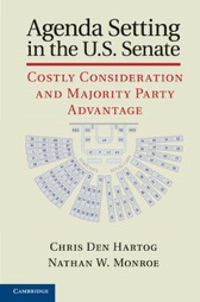
Date of Publication: 2011
Author: Chris Den Hartog and Nathan W. Monroe
Date of Publication: 2011
About the Book:
The proposes a new theory of Senate agenda setting that reconciles a divide in the literature between the conventional wisdom--according to which party power is mostly, if no completely, undermined by Senate procedures and norms--and the apparent partisan bias in Senate decision noted in recent empirical studies. Den Hartog and Monroe's theory revolves around a "costly consideration" framework for thinking about agenda setting, where moving proposals forward through the legislative process is seen as requiring scarce resources. To establish that the majority party pays lower agenda consideration costs as a result of various procedural advantage, a number of the chapters in this volume examine partisan influence at several stages of the legislative process, including committee reports, filibusters and cloture, floor scheduling, and floor amendments. Not only do the results strongly support the book's theoretical assumption and key hypotheses, but they shed new light on virtually ever major step in the Senate's legislative process.
About the Author:
Nathan Monroe is Associate Professor of Political Science and Tony Coelho Endowed Chair of Public Policy. He has published two books and numerous articles in top journals on legislative politics, especially focusing on parties and agenda setting in the U.S. Congress. Professor Monroe has several new research projects underway, including an NSF-funded investigation of legislative process in the United Nations General Assembly. He received his PhD from UC San Diego, his BA from UC Santa Barbara, and his AA from Modesto Junior College.
Link to Nathan Monroe’s webpage: https://faculty.ucmerced.edu/nmonroe2/index/Home.html
Link to buy the book: https://www.amazon.com/Agenda-Setting-U-S-Senate-Consideration/dp/1107006465



